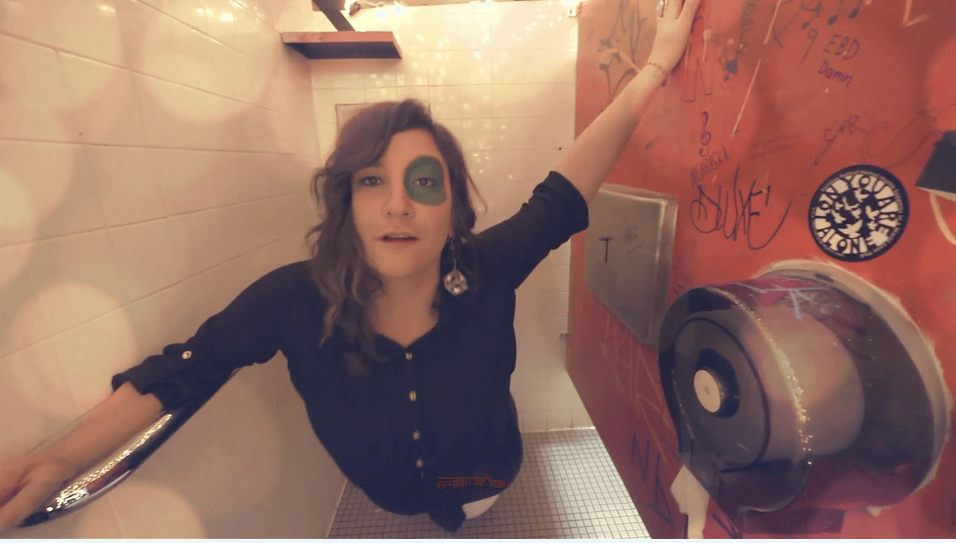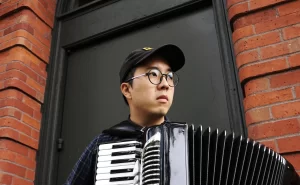(Article link, here)

Mindie Lind’s music glistens with intention, deliberation and style, and yet she says for the longest time she wasn’t conscious of her musicality. For all intents and purposes, Mindie’s exposure to music was a fluke, hinging on her adoption into a church-going family and then her coincidental friendships with “music makers” as a young adult. Now, she writes consciously, releasing stunning music videos as the visual backbone to her sound; an intersection between classic country, vulnerable poeticism, and straight-out-of-the church piano that is both unique and down-home, just like Mindie.
Mindie was born without legs and with six fingers. At a year old, she was adopted into a large Southern Baptist family and raised among many other adoptive children. Unfortunately, she says, she never felt the belonging and loving environment that family is supposed to provide. “I think for a lot of people, family is where you know ‘sameness’ and what relating feels like. The outside world is what different looks like. For me, family was so much about differences—I had blonde siblings, fat siblings, black siblings—nobody really looked like me, “ she said.
Her adoptive family did give her one positive thing—proximity to music through their church. “I grew up singing solos in church choir, and music was always there for me,” Mindie says. She also took piano lessons and played French horn in the orchestra, and yet, she never considered going into music as a career. Once in college, religion faded but music became an more vital part of her social life.
“Growing up it was all gospel acapella, orchestral, and some 90’s pop music on my own time. My parents didn’t listen to the Beatles, I didn’t know anything about them. When I got to college, it was Pink Floyd and Bob Dylan and all that stuff. I just went down the American music train. It blew my skull off,” she said.
When Mindie moved to Seattle after graduating college, she found herself wanting to participate. Eventually, she was singing along at jam sessions, playing piano and “accidentally” writing songs. “I do not know how it happened, but all my friends [in Seattle] were music makers. They were writing music and playing traditional stuff—which actually interacted a lot with my past because a lot of traditional American songs have roots in gospel—so I would sing along.”
I DID THIS BECAUSE I KNEW I COULD DO IT. I WENT FOR IT BECAUSE I THOUGHT I REALLY DID HAVE A CHANCE.
Since then, she’s written dozens of songs and she performs often. Perhaps her biggest accomplishment is becoming one of Lena Dunham’s go-to musicians and friends after submitting to an open call on Dunham’s website. “She chose people from certain towns to [go on her book tour with her]. She chose me and I was surprised in a way, but I also thought, “I did this because I knew I could do it. I went for it because I thought I really did have a chance,” she said.
Since, Mindie’s career has continued to take off, but she’s stayed in touch with the grounded girl she is; the person everyone wants to be friends with. More literally, she’s usually close to the ground, riding her skateboard as her main mode of transportation.
As Mindie says, “It’s a lot about convenience but it really is a politicized move… The conversation is not, ‘do you need help?’ but ‘that’s a neat way to get around.’ Which is just as patronizing, but I think it’s doing more.”

Mindie embodies “do you” to the maximum degree, but it’s not always easy. Curiously, it’s not her physical anomaly that makes it hard for her to be herself, but the way the world isolates people with no legs. As Mindie says, disability is a social condition–she is only “disabled” because she is without legs in a world that is made for people with legs.
“On a good day I get off on [not having legs], it can be the coolest. Everyone dyes their hair and wears this thing to be different and I just am. That is neat and that’s a privilege,” she says, “But on a bad day, it’s like ‘screw you I’m not your clown.’ I don’t want any of that responsibility…People are blinded by inaccurate stories about disability they’re being told again and again, and make me a symbol. It weighs on me.”
On the hard days, Mindie says it’s an awareness of her internal monologue that can help her center herself again, as well as spending time with people who make her feel supported. But perhaps most importantly, she reminds herself to believe in the good stuff that people see in her. This can be hard, especially because she says she can never know if people see her as an object of disability or a creator of art.
WHAT OTHER PEOPLE THINK IS REALLY NONE OF YOUR BUSINESS.
“There aren’t really any success stories of people with disability who perform that aren’t mostly being pimped out because of what their physical form does to people. And because of that, it’s always a question for me of is their reaction actually in touch with what I’m creating or with the other stuff? Nobody really knows, and what other people think is really none of your business. But I still think about it and find it confusing.”
In the next few years, Mindie has plans to continue releasing more music and music videos (including this one shot live video she did for Smart Girls with Project Girl Crush contributor Genevieve Pierson). Another life goal that is important to her is to develop a disabled character for TV, one that is intentional about projecting a more complex, unseen side of what she calls “real cripp life.” To follow her music go to her website, and for her other endeavors follow Mindie on Twitter @mindielind.



